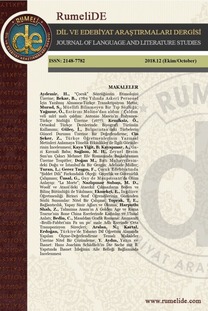Max Frisch’ in „Andorra“ eserinde etnik önyargilar
Bu çalışma, Max Frisch’in draması olan „Andorra“ daki Yahudilere yönelik önyargıları eserin ana karakteri Andri örneklemi üzerinden ve Allport’un insan düşüncesini kontrol altına alan ve masum bir insanı adım adım ölüme sürükleyebilecek önyargılara ilişkin skalasının aşamalarını dikkate alarak metne bağlı inceleme yöntemi ile inceleme amacı taşımaktadır. İsviçreli yazar Max Frisch’in 1961 yılında kaleme aldığı „Andorra“ adlı dramada Allport’un en zayıfından en şiddetlisine varan beş önyargı aşaması söz konusudur. İlk aşamada Andri Andorralı vatandaşların önyargılarının bir kurbanı rolünde sahneye çıkar. İkinci aşamada Andorralıların Yahudi kökeninden dolayı kendisine karşı düşmancıl duygular beslenen ve „öteki“ olarak toplumun dışına itilen söz konusu kurbanla her türlü iletişimden uzak durmaya meyletmeleri söz konusudur. Allport’un „ayrımcılık“ adını verdiği üçüncü aşamada ise ana karakter sosyal yaşamın her türlü alanından dışlanmış durumdadır. Bu aşamanın ardından her türlü fiziksel istismarı kapsayan fiziksel şiddet gelmektedir. Andri de Andorra’da hoşgörüsüz yurttaşlar tarafından (askerler) dövülür. Allport’un önyargı skalasının en uç seviyesinde ise Andri „beyaz“ Andorra’da bir Yahudi avcısının gözetiminde gerçekleştirilen Yahudi avında ölüme mahkum edilir. Andri, binaları beyaz badanalı olan ve vatandaşlarının korkacak hiçbir şeyi olmadığı kar beyazı bir ülkede kendine yer bulamaz ve günahsız yere önyargının kurbanı olur. Irkçı eyleminden dolayı en ufak bir suçluluk hissetmeyen ve kendini hala masum gören Andorra halkı ise önyargının insan eylemlerindeki belirleyici gücünü kanıtlamaktadır.
Anahtar Kelimeler:
Max Frisch, Önyargı, antisemitizm, ırkçılık
Ethnic Prejudices in “Andorra” by Max Frisch
This work examines Max Frisch's "Andorra" drama in relation to national prejudices against Jews in relation to the main character of the drama Andri with the inherent method, and within the framework of Allport's prejudice research, which examines the nature and development of prejudice and divides prejudice into five stages. The aim of this study ist to bring to light that prejudices unconsciously control people's thinking and, analogous to the levels of prejudice mentioned in Allport's scale, can lead an innocent person to death step by step. In the drama "Andorra", written by the Swiss writer Max Frisch in 1961, five levels of Allports are noticeable, which are arranged from the weakest to the strongest. At the first stage, Andri comes on stage as the victim of prejudices of Andorran citizens. The second stage is about the consequent avoidance of contact between the Andorrans and the person concerned, who is hostile because of Jewish origin and is marginalized as “another”. On the third level, the main character is excluded from all areas of social life, which Allport calls discrimination. This level is followed by physical violence, which includes all physical abuse. In Andorra, Andri is beaten up by intolerant countrymen (the soldiers). And as the highest level on the Allport prejudice scale, he is sentenced to death in a Jewish show led by a Jew showerer in "white" Andorra. Andri finds no place for himself in a snow-white country and in this country, whose buildings are whitewashed and whose citizens have nothing to fear, he becomes an innocent victim of prejudice. The people of Andorra, who do not feel the slightest guilt and still feel innocent for their racist action, prove the decisive power of prejudice in human actions.
Keywords:
Prejudice, anti-semitism, Max Frisch, discrimination,
___
- Allport, G. W. (1971). Die Natur des Vorurteils, Köln: Kiepenheuer & Witsch.
- Benz, W. / Widmann, P. (2007). Langlebige Feindschaften – Vom Nutzen der Vorurteilsforschung für den Umgang mit sozialer Vielfalt. In: Diversity Studies - Grundlagen und disziplinäre Ansätze. Hg. v. Krell, Gertraude/ Riedmüller, u.a., Frankfurt a. M.: Campus Verlag, S. 34-48.
- Böhm, J. (2001). “Türken-Images“ im öffentlichen Raum. Eine Ethnologische Spurensuche in Wien”, Diplomarbeit: Wien.
- Delhees, K. H. (1994): Soziale Kommunikation. Psychologische Grundlagen für das Miteinander in der Modernen Gesellschaft, Opladen: Westdeutscher Verlag.
- Fredrickson, G. M. (2004). Rassismus. Ein historischer Abriss, Hamburg: Hamburger Ed.
- Frisch, M. (1964). „Andorra“. In: Stücke, Band 2, Frankfurt am Main: Suhrkamp Verlag.
- Hort, R. (2007). Vorurteile und Stereotype. Soziale und dynamische Konstrukte, Saarbrücken, Verlag Dr. Müller.
- Kastenbutt, B. (2019). Abstinenz als Chance und Weg: Arbeitsmaterialien für Suchtselbsthilfegruppen, Norderstedt: Books on Demand.
- Langenscheidt. Deutsch-Latein Wörterbuch. https://de.langenscheidt.com/latein-deutsch/praeiudicare (letzter Zugriff: 14.03.2020).
- Memmi, A. (1992). Rassismus, Hamburg: Europäischer Verlag.
- Meyer, S. (2003. Ikonographie der Nation. Nationalstereotype in der englischen Druckgraphik des 18. Jahrhunderts, Münster: Waxmann Verlag.
- Nohlen, D. / Schultze, u.a. (1998). “Art. ‘Rassismus’”. In: Lexikon der Politik. Band 7. Politische Begriffe, München.
- Rohracher, H. (1965). In: Soziale Kommunikation. Psychologische Grundlagen für das Miteinander in der Modernen Gesellschaft. Delhees, Karl H. (1994), Opladen: Westdeutscher Verlag.
- Schmidt, M. G. (1995). Wörterbuch zur Politik, Stuttgart: Alfred Kröner Verlag.
- Sevilla-García, M. (2018). “Die Entstehung eines Andris in einer sozialen GemeinschaftEine Analyse des Identitätsproblems der Gestaltung „des Anderen“in der Gesellschaft durch das Dramastück Andorra Max Frisch”. Universitat de Barcelona. http://diposit.ub.edu/dspace/bitstream/2445/125910/1/MGS%20Garci%CC%81a%20Sevilla%20Mireia%20-%20TFG%20201718.pdf (letzter Zugriff: 26 Mai 2020).
- Yıldız, E. (1999). Fremdheit und Integration, Bergisch Gladbach: BLT.
- Zick, A. (1997). Vorurteile und Rassismus, Münster: Waxmann Verlag.
- Zick, A. / Küpper, u.a. (2012). “Vorurteile als Elemente Gruppenbezogener Menschenfeindlichkeit – eine Sichtung der Vorurteilsforschung und ein theoretischer Entwurf”. In: Vorurteile – Ursprünge, Formen, Bedeutung. Hg. v. Pelinka, Anton, Wien: De Gruyter, S. 287-316.
- ISSN: 2148-7782
- Yayın Aralığı: Yılda 6 Sayı
- Başlangıç: 2014
- Yayıncı: Yakup YILMAZ
Sayıdaki Diğer Makaleler
Malek Hassan Mahmoud ABDUL QADER
